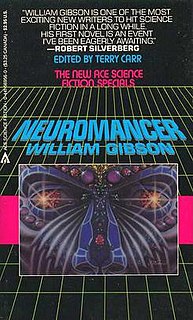
Neuromancer is a 1984 science fiction novel by American-Canadian writer William Gibson. Considered one of the earliest and best-known works in the cyberpunk genre, it is the only novel to win the Nebula Award, the Philip K. Dick Award, and the Hugo Award. It was Gibson's debut novel and the beginning of the Sprawl trilogy. Set in the future, the novel follows Henry Case, a washed-up hacker hired for one last job, which brings him in contact with powerful artificial intelligence.
Utopian and dystopian fiction are genres of speculative fiction that explore social and political structures. Utopian fiction portrays a setting that agrees with the author's ethos, having various attributes of another reality intended to appeal to readers. Dystopian fiction offers the opposite: the portrayal of a setting that completely disagrees with the author's ethos. Some novels combine both genres, often as a metaphor for the different directions humanity can take depending on its choices, ending up with one of two possible futures. Both utopias and dystopias are commonly found in science fiction and other types of speculative fiction.

Apocalyptic and post-apocalyptic fiction is a subgenre of science fiction, science fantasy, dystopia or horror in which the Earth's civilization is collapsing or has collapsed. The apocalypse event may be climatic, such as runaway climate change; astronomical, such as an impact event; destructive, such as nuclear holocaust or resource depletion; medical, such as a pandemic, whether natural or human-caused; end time, such as the Last Judgment, Second Coming or Ragnarök; or more imaginative, such as a zombie apocalypse, cybernetic revolt, technological singularity, dysgenics or alien invasion.

The Last Starfighter is a 1984 American space opera film directed by Nick Castle. The film tells the story of Alex Rogan, a teenager recruited by an alien defense force to fight in an interstellar war. It also features Robert Preston, Dan O'Herlihy, Catherine Mary Stewart, Norman Snow, and Kay E. Kuter.
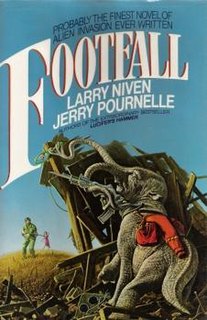
Footfall is a 1985 science fiction novel by American writers Larry Niven and Jerry Pournelle. The book depicts the arrival of members of an alien species called the Fithp that have traveled to the solar system from Alpha Centauri in a large spacecraft driven by a Bussard ramjet. Their intent is conquest of the planet Earth.

GoldenEye: Rogue Agent is a first-person shooter video game in the James Bond franchise, developed by EA Los Angeles and published by Electronic Arts. The player takes the role of an ex-MI6 agent, who is recruited by Auric Goldfinger to assassinate his rival Dr. No. Several other characters from the Bond franchise make appearances throughout the game, including Pussy Galore, Oddjob, Xenia Onatopp and Francisco Scaramanga.

The Starchild Trilogy is a series of three science fiction novels written by Frederik Pohl and Jack Williamson. In the future depicted in this series, mankind is ruled by a brutal totalitarian government known as the Plan of Man, enforced by a computerized surveillance state.
The exploration of politics in science fiction is arguably older than the identification of the genre. One of the earliest works of modern science fiction, H. G. Wells’ The Time Machine, is an extrapolation of the class structure of the United Kingdom of his time, an extreme form of social Darwinism; during tens of thousands of years, human beings have evolved into two different species based on their social class.
In both science fiction and utopia/dystopian fiction, authors have made frequent use of the age-old idea of a global state and, accordingly, of world government.
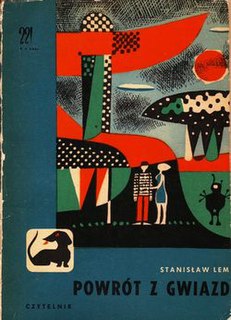
Return from the Stars is a science fiction novel by Polish author Stanisław Lem. Written in 1961, it is the story of a cosmonaut returning to his homeworld, Earth, after more than a century in Earth time, but just 10 years for him, finding it a completely different place, with many developments he dislikes. The novel touches the ideas of social alienation, culture shock and dystopia. It was first translated into English in 1980 by Barbara Marszal and Frank Simpson.
Il était une fois… l'Espace is an animated science fiction television series from 1982 until 1983, directed by Albert Barillé. It is part of the Once Upon a Time... franchise.

The Viagens Interplanetarias series is a sequence of science fiction stories by L. Sprague de Camp, begun in the late 1940s and written under the influence of contemporary space opera and sword and planet stories, particularly Edgar Rice Burroughs's Martian novels. Set in the future in the 21st and 22nd centuries, the series is named for the quasi-public Terran agency portrayed as monopolizing interstellar travel, the Brazilian-dominated Viagens Interplanetarias. It is also known as the Krishna series, as the majority of the stories belong to a sequence set on a fictional planet of that name. While de Camp started out as a science fiction writer and his early reputation was based on his short stories in the genre, the Viagens tales represent his only extended science fiction series.
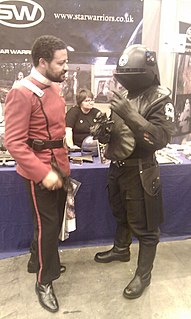
Star Trek and Star Wars are American media franchises which present alternative scenarios of space adventure. The two franchises dominate this setting of storytelling and have offered various forms of media productions for decades that manage billions of dollars of intellectual property, providing employment and entertainment for countless people around the world.

Rogue Male, by Geoffrey Household, is a classic thriller novel, published in 1939. The book was reissued in 2007 with an introduction by Victoria Nelson.
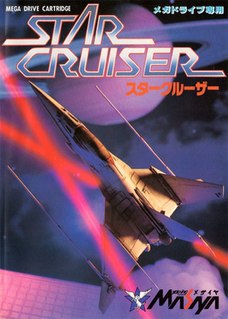
Star Cruiser is a role-playing first-person shooter video game developed by Arsys Software and released in Japan for the PC-8801 and X1 home computers in 1988. The game was released for the PC-9801 and X68000 computers in 1989, and then ported by Masaya (NCS) to the Mega Drive in 1990.

Passengers is a 2016 American science-fiction romance film directed by Morten Tyldum and written by Jon Spaihts, partially based on the 1950s EC Comics story "50 Girls 50". It stars Jennifer Lawrence and Chris Pratt, with Michael Sheen and Laurence Fishburne in supporting roles. It follows two passengers on an immense interstellar spacecraft carrying thousands of people to a colony 60 light years from Earth, when the two are awakened 90 years early from their induced hibernation.
Organ transplantation is a common theme in science fiction and horror fiction. Numerous horror movies feature the theme of transplanted body parts that are evil or give supernatural powers, with examples including Body Parts, Hands of a Stranger, and The Eye.

Jyn Erso is a fictional character in the Star Wars franchise, portrayed by English actress Felicity Jones in the 2016 film Rogue One. Jyn aids the Rebel Alliance in a desperate attempt to steal the plans to the Death Star, a weapon of the Galactic Empire with enough power to destroy an entire planet. The character was introduced as a child in the 2016 prequel novel Catalyst by James Luceno.
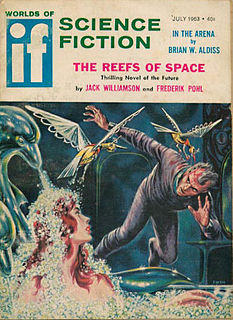
The Reefs of Space is a dystopian science fiction novel by American writers Frederik Pohl and Jack Williamson, published in 1964. It is part of the Starchild Trilogy, the other books in the series being Starchild (1965) and Rogue Star (1969).

Starchild is a dystopian science fiction novel by American writers Frederik Pohl and Jack Williamson, published in 1965. It is part of the Starchild Trilogy, a series of three books, the others being The Reefs of Space (1964) and Rogue Star (1969). Starchild is about a rebellion against the government-computer by a mysterious person or group called the "Starchild".















